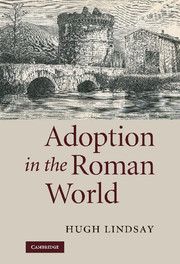Book contents
- Frontmatter
- Contents
- List of figures
- Preface
- List of abbreviations
- Introduction
- 1 Adoption, kinship and the family: cross-cultural perspectives
- 2 Kinship in Greece and Rome
- 3 Greek adoptions: comparisons and possible influences on the Roman world
- 4 Procedural aspects of Roman adoption
- 5 The testamentary adoption
- 6 Roman nomenclature after adoption
- 7 Adoption and inheritance
- 8 Roman freedmen and their families: the use of adoption
- 9 Adoption in Plautus and Terence
- 10 Sallust and the adoption of Jugurtha
- 11 Adrogatio and adoptio from Republic to Empire
- 12 Testamentary adoptions – a review of some known cases
- 13 Political adoptions in the Republic
- 14 Clodius and his adoption
- 15 The adoption of Octavian
- 16 Political adoption in the early Empire at Rome, Pompeii and Ostia; the imperial family
- Conclusion
- Glossary
- References
- Index
16 - Political adoption in the early Empire at Rome, Pompeii and Ostia; the imperial family
Published online by Cambridge University Press: 25 January 2010
- Frontmatter
- Contents
- List of figures
- Preface
- List of abbreviations
- Introduction
- 1 Adoption, kinship and the family: cross-cultural perspectives
- 2 Kinship in Greece and Rome
- 3 Greek adoptions: comparisons and possible influences on the Roman world
- 4 Procedural aspects of Roman adoption
- 5 The testamentary adoption
- 6 Roman nomenclature after adoption
- 7 Adoption and inheritance
- 8 Roman freedmen and their families: the use of adoption
- 9 Adoption in Plautus and Terence
- 10 Sallust and the adoption of Jugurtha
- 11 Adrogatio and adoptio from Republic to Empire
- 12 Testamentary adoptions – a review of some known cases
- 13 Political adoptions in the Republic
- 14 Clodius and his adoption
- 15 The adoption of Octavian
- 16 Political adoption in the early Empire at Rome, Pompeii and Ostia; the imperial family
- Conclusion
- Glossary
- References
- Index
Summary
the early empire at rome
Elite adoption can be said to involve similar issues in both late Republic and early Empire. Politics and inheritance were paramount. Regardless of status, Romans were concerned about continuity of family traditions, broadly interpreted. In the senatorial class, focus was on individual and group success in the cursus honorum and on the bundle of activities which resulted in individual honor. Military success and its public acknowledgement formed part of this, especially in the period of Rome's greatest growth. Inheritance of wealth was also a key issue. Particular items of real property closely associated with elite success may have been in some cases tied to social and political identity. These questions of sentiment and control might have encouraged adoption as a tool to foster continuity. Admittedly properties were also often freely acquired and disposed of, as can be seen from the case of Cicero (E. Rawson [1976] 85–102). The concept of ancestral properties in the manner of the British aristocracy appears little developed, but this may simply be a gap in our evidence. However, Crook plausibly suggests that the power derived from inheritance was largely the power to alienate property and determine succession to the capital wrapped up in it (Crook [1986] 58).
Demographic factors conspired to make linear succession a relatively difficult prospect. In the case of the childless, adoption provided a method to continue a tradition under threat.
- Type
- Chapter
- Information
- Adoption in the Roman World , pp. 190 - 216Publisher: Cambridge University PressPrint publication year: 2009



